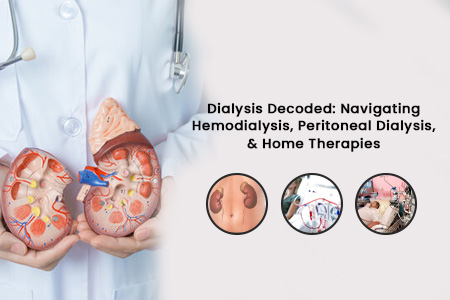2024-07-10
2024-04-12
2023-10-12
2023-09-13
2023-08-06
2023-08-04
2023-07-29
2023-07-05
2023-06-09
2023-02-03
2023-02-02
2023-01-06
2023-01-05
2023-01-04
2023-01-03
2023-01-02
2022-11-02
2022-07-30

For individuals with kidney failure, dialysis serves as a lifeline, effectively removing waste products and excess fluids from the body. However, choosing the right dialysis option can be overwhelming. In this comprehensive guide, we'll unravel the intricacies of hemodialysis, peritoneal dialysis, and home therapies, empowering you to make informed decisions about your renal care.
1. Hemodialysis:
Hemodialysis is the most common form of dialysis, typically performed in a clinical setting three times a week. During hemodialysis, blood is removed from the body, filtered through a dialyzer to remove waste and excess fluid, and then returned to the bloodstream. This process usually takes around four hours per session and requires vascular access, such as a fistula or catheter.
Pros of Hemodialysis:
- Effective in quickly removing toxins and excess fluids from the bloodstream.
- Monitored by trained healthcare professionals during each session.
- Allows for social interaction with other patients during treatment.
Cons of Hemodialysis:
- Requires frequent visits to a dialysis center, which can disrupt daily routines.
- Increased risk of complications such as infections, blood clots, and vascular access issues.
- Limited flexibility in scheduling and lifestyle choices.
2. Peritoneal Dialysis:
Peritoneal dialysis involves using the peritoneal membrane in the abdomen as a natural filter to remove waste and fluid from the body. A catheter is surgically implanted into the abdomen, allowing for the infusion of dialysis solution into the peritoneal cavity. The solution remains in the abdomen for a prescribed period, during which waste products and excess fluid are removed, and then drained out through the catheter.
Pros of Peritoneal Dialysis:
- Offers greater flexibility and independence, as treatments can be performed at home or during travel.
- Continuous dialysis throughout the day provides more gradual fluid and waste removal, mimicking natural kidney function.
- Reduced risk of vascular access complications compared to hemodialysis.
Cons of Peritoneal Dialysis:
- Requires daily exchanges of dialysis solution, which may be cumbersome for some individuals.
- Risk of peritonitis (infection of the peritoneal membrane) and other complications associated with the catheter.
- Requires strict adherence to hygiene protocols and regular monitoring by healthcare providers.
3. Home Therapies:
Advances in technology have made home-based dialysis therapies increasingly accessible and convenient for patients. Both hemodialysis and peritoneal dialysis can be performed in the comfort of one's home, allowing for greater autonomy and flexibility in treatment schedules.
Pros of Home Therapies:
- Provides greater freedom and control over treatment schedules, allowing for more integration with daily activities.
- Reduces the need for frequent visits to dialysis centers, minimizing disruptions to work, school, and family life.
- May offer a sense of empowerment and independence for patients managing their own care.
Cons of Home Therapies:
- Requires comprehensive training and education for patients and caregivers to perform dialysis safely at home.
- Responsibility for managing equipment, supplies, and infection control measures falls on the patient or caregiver.
- Continuous monitoring and communication with healthcare providers are essential to ensure optimal treatment outcomes and early detection of complications.
Conclusion:
Choosing the right dialysis option is a deeply personal decision that depends on individual preferences, lifestyle, and medical needs. Whether you opt for hemodialysis, peritoneal dialysis, or home therapies, understanding the benefits and limitations of each option is crucial for making informed choices about your renal care. Consult with your healthcare team to explore all available options and develop a comprehensive treatment plan tailored to your unique circumstances.
For expert guidance and comprehensive support in navigating dialysis options, consider consulting the specialized nephrology team at Sree Manju Hospital. With a focus on patient-centered care and cutting-edge treatments, Sree Manju Hospital offers personalized solutions to meet your renal care needs. Whether you're considering hemodialysis, peritoneal dialysis, or home therapies, trust the experienced professionals at Sree Manju Hospital to guide you towards optimal kidney health and improved quality of life. Schedule a consultation today to take the first step towards managing your kidney condition with confidence and clarity.